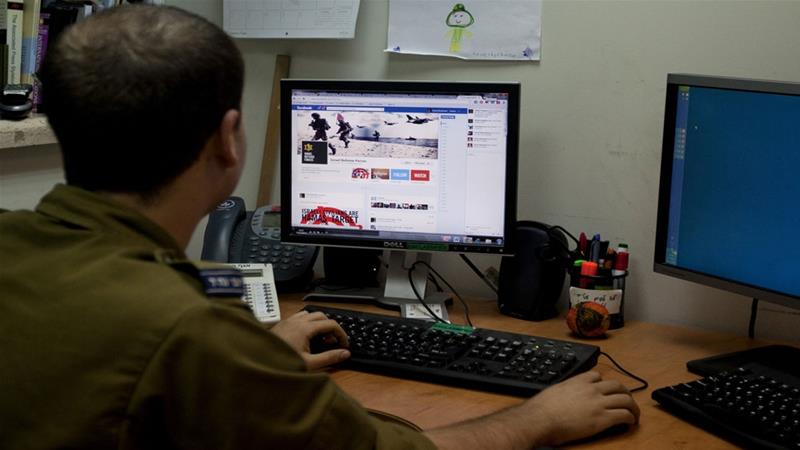Digital occupation: What’s behind Israel’s social media in Arabic

Israeli social media accounts in Arabic aim to normalise Israel’s occupation and whitewash its image, Palestinians say.
Israeli accounts in Arabic cushion their propaganda in inoffensive, reasonable language, peppered with Arab proverbs and Quranic verses [File: The Associated Press]
On any given Friday, spokesperson for the Israeli army Avichay Adraee sends out a message to his more than 186,000 followers on Twitter.
“Have a blessed Friday,” he tweets in Arabic. Sometimes the message is accompanied by a Quranic verse or a hadith, a saying of the Prophet Muhammad.
Every so often his posts turn to contemplations that address his Palestinian and Arab followers.
“How would you like to be remembered by people, as respected and successful or as troublemaking terrorists?” he posted last month. “The successful Mohamad Salah and Mostafa al-Agha or the cowardly terrorist Ahmad Jarrar? Think twice.”
The references to Saleh, a popular Egyptian football player, and Agha, a Syrian presenter of a sports programme on the Saudi-owned MBC channel, are used as an ideal model of what an Arab man should be like.
In contrast there is Jarrar, a Palestinian man who was suspected of being behind the killing of a Jewish settler near the city of Nablus in the occupied West Bank in January. Jarrar was killed after a month-long manhunt by the Israeli forces last February.
Whitewashing occupation
Adraee’s Twitter and Facebook pages are among several mushrooming social media accounts in Arabic by Israeli military and government officials that target Arab citizens.
According to Fidaa Zaanin, an outspoken Palestinian critic of these accounts, they have one unified objective, which is to penetrate the ranks of Arabic-speaking world.
“By conversing with them in their mother tongue, these Israeli officials are opening communication channels, and disseminate lies and propaganda with the aim to normalise the Israeli occupation and to whitewash the image of the Zionist entity,” Zaanin, who is from Gaza but now lives in Berlin, told Al Jazeera.
“Israel is portrayed as the only democracy in the Middle East, a progressive humane state, and the victim of violence and terrorism,” she continued, “thus censoring a whole history of colonisation, murder and forced displacement.”
One example is of Adraee tweeting about the Land Day protests that took place near the Gaza Strip’s eastern border last week, in which 17 Palestinians were shot dead by Israeli forces.
“Sending 30,000 troublemakers to fight at the security fence only points to Hamas’s terrorism and their attempt to exploit the citizens of Gaza,” he said.
Nadim Nashif, the executive director of 7amleh, the Arab Centre for Social Media Advancement, said that the Israeli accounts in Arabic have become more popular among Palestinian social media users in the last year.
“This constitutes the first time Palestinian citizens have direct online contact with high ranking Israeli officials, given that [most] Palestinians from the West Bank and Gaza Strip don’t speak or read Hebrew,” he told Al Jazeera.
The accounts also provide practical information to Palestinians, such as the opening and closing hours of checkpoints and how to obtain military-issued permits for travel or medical purposes.
“The Israelis are therefore capitalising on the needs of Palestinians to attract attention and engagement in order to serve the purpose of their political agenda,” Nashif said.
Al Jazeera reached out to the Israeli army’s media office for comment but did not receive a reply at the time of publication.
‘Digital occupation’
Following the Arab uprisings in 2011, Arab usage of social media platforms increased, representing an alternative to traditional media outlets that are mostly seen as mouthpieces of Arab regimes.
It is not a coincidence, Zaanin said, that the social media accounts of Adraee and Ofir Gendelman, the spokesperson for Israeli Prime Minister Benjamin Netanyahu, were set up in the same year.
“It is not surprising that the Israeli army added new units of Arabic-speaking pages to its arsenal of various weapons,” she said.
In 2016, an account was also set up for the Coordinator of Government Activities in the Territories (COGAT), a unit of the Israeli military in the occupied West Bank. Other pages on Facebook include Israel Speaks in Arabic, which has 1.4 million followers, and pages belonging to Israeli embassies in Egypt and Jordan.
According to Zaanin, the open communication channel is set up to extract information from Palestinians and other Arabs, intimidate Palestinians from carrying out individual attacks against Israelis, and to vilify any form of Palestinian resistance.
“COGAT also exploits the bad situation in the Gaza Strip by blackmailing residents by promising them medical or travel permits or financial help to poor families, in exchange for providing them with information required by intelligence agents,” she explained. “They then drop them and extort them as a form of recruitment.”
Nashif calls this phenomenon “digital occupation” through which Israel is expanding its control, surveillance and oppression of Palestinians from reality to the virtual sphere.
One page, called Bidna Na’eesh in Arabic (We want to live), provides a telephone number for Palestinians to report information on wanted individuals and “perpetrators of attacks” against Israelis.
“Inform us, and you will benefit,” the banner’s page says, showing a picture of a wad of 100 dollar bills above a cartoon of a hand shake with an Israeli flag.
“This is extremely dangerous as it forms part of Israel’s militarisation of the digital sphere, as there are tens of pages that have been created by military forces and secret services,” Nashif said.
Arab interaction
Zaanin believes that the increase of Arab interaction with these Israeli accounts largely stems from ignorance and an underestimation of the effect that these interactions have in the short and long term.
Far from using firebrand rhetoric, Israeli accounts in Arabic cushion their propaganda in inoffensive, seemingly reasonable language, peppered with Arab proverbs and Quranic verses. They also present themselves as being concerned with the wellbeing of the Arab citizen, and the dangers of being led astray by “terrorists” or any resistance to the Israeli state and occupation.
“There’s also the possibility that a large number of followers of the accounts, whether on Facebook or Twitter, are Israelis aiming to trick Arab citizen to interact positively with them to break the barrier of fear,” Zaanin said, adding that there are no official statistics about the followers’ details.
According to Zaanin, Arab interaction with the accounts falls into two categories; those who know what they represent and respond by taunts, curses, or arguing the case for Palestinian rights, and those who see no problem in normalising relations with Israel and seek to satisfy their curiosity.
“One important point to me is that the appearance of Israeli officials on Arab television news channels has contributed to the Arab citizen’s acceptance of them [on social media],” Zaanin said.
‘Free service’ to Israeli intelligence
Both Nashif and Zaanin agree that the proliferation of Arabic-language Israeli accounts is testament to the absence of any form of grassroot tactics, including raising awareness about the dangers these pages pose to Arab social media users, such as potential extortion.
One way is to boycott the pages, and to raise awareness about their real motives, they said.
“Arabs are providing Israelis with a free service,” Zaanin said. “They unwittingly provide Israeli intelligence officers with information, which is then used to infiltrate the accounts of Arab users.
“It’s like handing over the keys to your home to your enemy,” she added.
“More awareness should be raised around the issue,” Nashif agreed. “Especially on a local level for Palestinians who should be advised to dissociate with these pages for their own personal safety and security.”
‘Facebook collaboration’
Another way to confront the Israeli accounts in Arabic is by setting up Palestinian and Arab accounts that refute Israeli propaganda.
“Unfortunately, social networking sites such as Facebook actively fight Palestinian content and delete such accounts,” Zaanin said.
The collaboration between Israeli surveillance and Facebook is not new. According to 7amleh’s annual Palestinian Digital Activism Report published on Tuesday, the cyber unit of the Israeli government officially stated that Facebook accepted 85 percent of the government’s requests to delete content, accounts and pages of Palestinians in the year 2017.
“This kind of Israeli monitoring and control of Palestinian digital content on social media has become a tool for mass arrests and gross human rights and digital rights violations,” the report stated.
In fact, more than 300 Palestinians from the West Bank, including occupied East Jerusalem, were arrested by Israeli forces and tried in military courts because of social media posts, 7amleh said.
“These accounts are nothing more than a different combat unit,” Zaanin said, “which is why it is very dangerous to interact with them at all.”









